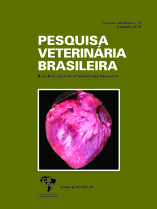 |
|
|
|
Year 2018 - Volume 38, Number 10
|

|
Tumor-associated macrophage is correlated with survival and SOCS protein expression in canine mammary carcinoma, 38(10):1972-1980
|
ABSTRACT.- Vieira-Filho C.H.C., Barrouin-Melo S.M., Damasceno K.A., Araújo M.S.S., Borges N.F., Silva F.L., Cassali G.D. & Estrela-Lima A. 2018. Tumor-associated macrophage is correlated with survival and SOCS expression in canine mammary carcinoma. [Correlação do infiltrado macrofágico com a sobrevida e a expressão da proteína SOCS no carcinoma mamário canino.] Pesquisa Veterinária Brasileira 38(10):1972-1980. Escola de Medicina Veterinária e Zootecnia, Universidade Federal da Bahia, Av. Adhemar de Barros 500, Ondina, Salvador, BA 40170-110, Brazil. E-mail: aestrela@ufba.br
The inflammatory infiltrate in the tumor microenvironment, particularly in mammary tumors, has aroused great interest in oncology, to play different roles in the progression or tumor regression dependent on the types and cell subsets involved. The present study aimed to evaluate (1) the occurrence and intensity of macrophage infiltration in the mammary carcinoma microenvironment, (2) the expression of SOCS1 and SOCS3 proteins in tumor associated macrophages, (3) any association between these parameters and tumor development, as well as survival rates in female dogs. Twenty-two female dogs diagnosed as carcinoma arising in a mixed tumor (CMT) by histopathology were divided into two groups following mastectomy: dogs without metastasis (CMT(-)=11) and those with metastasis (CMT(+)=11). The following parameters were analyzed: tumor size, lymph node metastasis, clinical stage, histological grade, distribution and intensity of inflammatory infiltrate, tumor macrophage quantification by immunohistochemical analysis of SOCS1 and SOCS3 expression, and immunophenotyping of peripheral blood leukocytes by flow cytometry. Dogs with the higher proportions of macrophages in the inflammatory infiltrate (≥400/tumor) also had higher survival rates in comparison with dogs with less macrophages. Immunostaining revealed higher proportions of SOCS3-positive macrophages in dogs without lymph node metastasis, while SOCS1-positive macrophages were predominant in dogs with metastasis (p<0.05). Multivariate analysis found associations between survival rate and clinical staging (p=0.025), histological grade (p=0.007), and the expression of MHC-CI in circulating monocytes (p=0.018). Higher SOCS3 expression in activated macrophages within the inflammatory infiltrate were considered indicative of an antitumor immune response, improved clinicopathological parameters and longer survival, whereas SOCS1-related activation was associated with tumor progression, metastasis development and reduced survival in female dogs with mammary carcinomas. |
| |
|
|
| |
|
 |